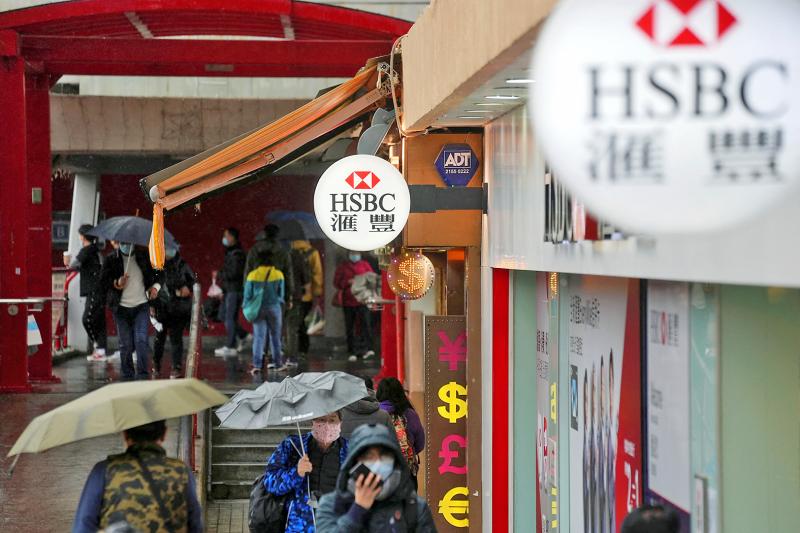HSBC Holdings PLC, Citigroup Inc and Bank of China (Hong Kong) said they would close all of their retail branches in Hong Kong temporarily on Saturdays from next week, as the territory scrambles to contain its worst outbreak of COVID-19.
HSBC, the territory’s largest lender, would also shut 11 more outlets starting from Wednesday after several staff tested positive for COVID-19, the London-based bank said in a statement.
The bank, which operates about 100 outlets in Hong Kong, last week closed some branches, including the one in its main office building in Central District.

Photo: Reuters
Bank of China (Hong Kong) would close a dozen branches temporarily from Wednesday, after employees had preliminary positive tests, while Citigroup shut two branches from Feb. 11, separate statements from the banks said.
Hong Kong has been hit by the worst outbreak since the COVID-19 pandemic began, with new infections now in the thousands each day.
The territory said it would conduct compulsory testing of its entire 7.4 million population three times next month, deploying a key mainland China strategy to slow the outbreak, which has pushed Hong Kong’s resources to the brink.
The financial hub is considering imposing increasingly draconian measures, with a Hong Kong lawmaker calling for a short lockdown to rein in the outbreak.
“This is a precautionary measure to safeguard the health and safety of the bank’s employees and customers in light of the rapidly evolving COVID-19 situation in Hong Kong,” the HSBC statement said.
HSBC chief financial officer Ewen Stevenson on Tuesday said that there could be some disappointment in wealth revenues in the first quarter, as the bank had to close about half of its branches in Hong Kong.

SEEKING CLARITY: Washington should not adopt measures that create uncertainties for ‘existing semiconductor investments,’ TSMC said referring to its US$165 billion in the US Taiwan Semiconductor Manufacturing Co (TSMC, 台積電) told the US that any future tariffs on Taiwanese semiconductors could reduce demand for chips and derail its pledge to increase its investment in Arizona. “New import restrictions could jeopardize current US leadership in the competitive technology industry and create uncertainties for many committed semiconductor capital projects in the US, including TSMC Arizona’s significant investment plan in Phoenix,” the chipmaker wrote in a letter to the US Department of Commerce. TSMC issued the warning in response to a solicitation for comments by the department on a possible tariff on semiconductor imports by US President Donald Trump’s

The government has launched a three-pronged strategy to attract local and international talent, aiming to position Taiwan as a new global hub following Nvidia Corp’s announcement that it has chosen Taipei as the site of its Taiwan headquarters. Nvidia cofounder and CEO Jensen Huang (黃仁勳) on Monday last week announced during his keynote speech at the Computex trade show in Taipei that the Nvidia Constellation, the company’s planned Taiwan headquarters, would be located in the Beitou-Shilin Technology Park (北投士林科技園區) in Taipei. Huang’s decision to establish a base in Taiwan is “primarily due to Taiwan’s talent pool and its strength in the semiconductor

An earnings report from semiconductor giant and artificial intelligence (AI) bellwether Nvidia Corp takes center stage for Wall Street this week, as stocks hit a speed bump of worries over US federal deficits driving up Treasury yields. US equities pulled back last week after a torrid rally, as investors turned their attention to tax and spending legislation poised to swell the US government’s US$36 trillion in debt. Long-dated US Treasury yields rose amid the fiscal worries, with the 30-year yield topping 5 percent and hitting its highest level since late 2023. Stocks were dealt another blow on Friday when US President Donald

UNCERTAINTY: Investors remain worried that trade negotiations with Washington could go poorly, given Trump’s inconsistency on tariffs in his second term, experts said The consumer confidence index this month fell for a ninth consecutive month to its lowest level in 13 months, as global trade uncertainties and tariff risks cloud Taiwan’s economic outlook, a survey released yesterday by National Central University found. The biggest decline came from the timing for stock investments, which plunged 11.82 points to 26.82, underscoring bleak investor confidence, it said. “Although the TAIEX reclaimed the 21,000-point mark after the US and China agreed to bury the hatchet for 90 days, investors remain worried that the situation would turn sour later,” said Dachrahn Wu (吳大任), director of the university’s Research Center for